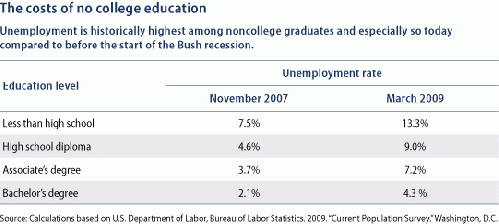Those with a college degree historically fare better during economic downturns. This is especially so when reviewing current figures:
Prepared by the Center for American Progress.
Obama will increase Pell grants by $200 per student, and eliminate the Federal Family Education Loan Program. This will cut out the banker middleman, a move private banks are fighting. This sounds good on the surface, but, according to an AP analysis, if all 132,000 HBCU students taking Pell grants received the $200 increase, the boost is only one-third of the cut.
Obama defends the move, claiming that "the change would save at least $48 billion over the next 10 years - money that could be funneled to student aid," writes HBCU.com blogger, Reginald Culpepper. No doubt, private banks make the student loan program inefficient. Obama asserts this is "a premium we cannot afford, not when we could be reinvesting that same money in our students, in our economy and in our country."
According to the United Negro College Fund, HBCUs make up just 3% of US colleges but graduate nearly 25% of all African Americans who earn undergraduate degrees. UNCF members Spelman College and Bennett College produce over half of the nation's African American female doctorates in all science fields.Â
But HBCUs have a lower graduation rate than other colleges, according to the AP. Obama's budget priorities recognize this disparity:
"It is not enough for the Nation to enroll more students in college; we also need to graduate more students from college. A few States and institutions have begun to experiment with these approaches, but there is much more they can do. The Budget includes a new five-year, $2.5 billion Access and Completion Incentive Fund to support innovative State efforts to help low-income students succeed and complete their college education."
The $2.5 billion ACI Fund has some in the field of higher education worried about loss of autonomy, thinks Kevin Carey of The Quick and the Ed:
"If enacted, this could be a very big deal.... [N]ational higher education policy has been governed by a well-understood principle: The feds don't give colleges any money to directly support education, and in exchange the feds don't have any say in what colleges do.
"[The ACI Fund] could alter that relationship, perhaps fundamentally.... [T]here are plenty of folks in the higher education world who would gladly turn down $2.5 billion in order to preserve the sacred principles of institutional autonomy and federal non-interference. And if there's one thing they have in common, it's this: they're not the people educating low-income college students."
The Center for American Progress likes Obama's concept. "The ACIF is intended to promote an environment of educational innovation on college campuses so that low-income working adults can get the education they need during the times they can attend classes."Â
The Center suggests that the ACI Fund use an open-source competitive grants process, "to enhance the current state-driven funding model with an ability to single out projects that will add to national productivity, security, and quality of life."





